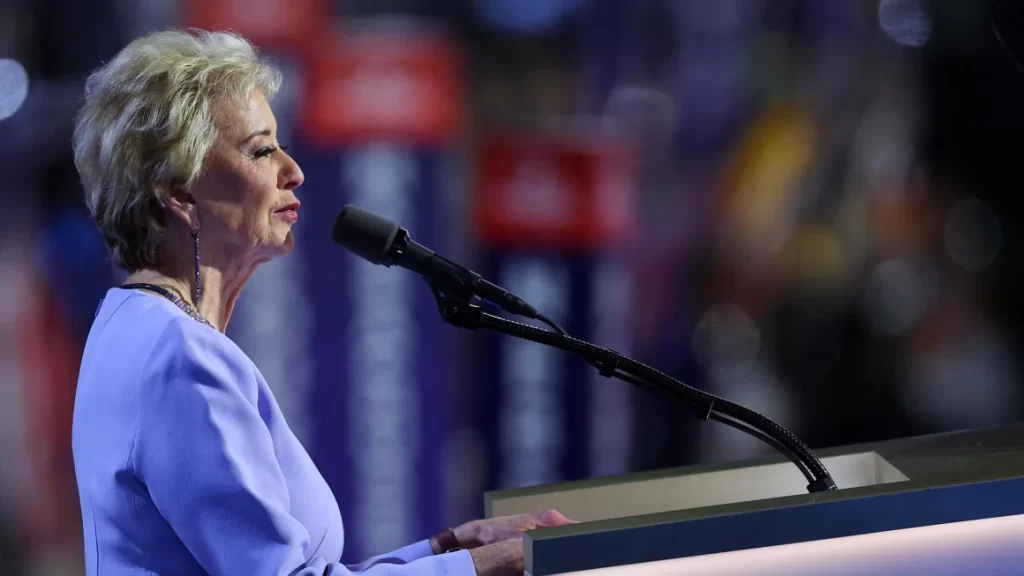Trump names Linda McMahon as his pick for Education secretary
3 min read
Linda McMahon speaks during the 2024 Republican National Convention in Milwaukee.

Linda McMahon speaks during the 2024 Republican National Convention in Milwaukee.
President-elect Donald Trump has named Linda McMahon, his transition co-chair, as his pick to serve as the next Secretary of the Department of Education. The announcement, made on Tuesday evening, follows earlier reports confirming the decision, with CNN first breaking the news. The choice comes after it became clear that McMahon would be passed over for the role of Commerce Secretary, a position Trump assigned to his other transition co-chair, Howard Lutnick, earlier in the day.
Trump praised McMahon’s qualifications in a statement, emphasizing her extensive leadership experience and deep understanding of both education and business. “Linda will use her decades of leadership experience to empower the next generation of American students and workers and make America number one in education in the world,” Trump said. He also stressed the goal of returning education to the states, with McMahon at the helm of this effort.
McMahon, a prominent Republican donor and former professional wrestling executive, has been involved in public service before. She served as the administrator of the Small Business Administration (SBA) during Trump’s first term, appointed in 2017. She resigned from the SBA in 2019 to take on a leadership role with America First Action, a pro-Trump super PAC. McMahon is also the board chair of the America First Policy Institute (AFPI), a think tank established in 2021 by McMahon, former National Economic Council director Larry Kudlow, and other Trump administration advisers. The institute has raised millions of dollars since its creation and is seen as a key player in shaping policy proposals for Trump’s potential second term.
One of the challenges facing McMahon as Education Secretary could be her role in potentially downsizing or dismantling the Department of Education, a goal Trump repeatedly mentioned on the campaign trail. While the complete elimination of the department would be difficult due to its oversight of nearly every public K-12 school in the U.S. and its management of a $1.6 trillion federal student loan portfolio, Trump’s administration could seek to reduce the federal government’s influence in local education. This might involve redirecting funds directly to states and schools, with fewer strings attached, rather than dismantling the agency entirely. Eliminating the Department of Education would require an act of Congress, making this goal unlikely in the short term.
Under McMahon’s leadership, the Department of Education could also work to undo several initiatives from the Biden administration. For example, the Trump administration may seek to reverse changes made to Title IX, the federal law that prohibits discrimination based on sex in educational institutions. These changes, which expanded protections for LGBTQ+ students, may be targeted by McMahon’s department. Trump had campaigned on the issue of limiting the participation of transgender students in girls’ sports teams, and McMahon’s department could potentially draft new rules to align with these views.
McMahon’s experience extends beyond politics and education. She is the former CEO of World Wrestling Entertainment (WWE), a company she co-founded with her husband, Vince McMahon. Under her leadership, WWE transformed from a small wrestling company into a global media empire, and she served as its CEO until stepping down in 2009.
Although McMahon has a strong business background, her political experience is more limited. She ran for U.S. Senate in Connecticut twice, in 2010 and 2012, but was unsuccessful in both campaigns. In 2010, she spent over $50 million of her own money on the campaign, and another $48.7 million in 2012, according to data from Open Secrets, an organization that tracks campaign financing. During her 2012 Senate run, Trump contributed $5,000 to her campaign.
McMahon has also been a significant Republican donor. In Trump’s first presidential campaign, she donated more than $7 million to two pro-Trump super PACs, further solidifying her influence within the Republican Party.
As McMahon prepares to take on the role of Education Secretary, her track record in business, philanthropy, and politics will likely shape her approach to education policy. While the future of the Department of Education remains uncertain, McMahon’s appointment signals Trump’s continued focus on reshaping federal involvement in education, with a particular emphasis on returning control to the states and reducing regulatory oversight. Her leadership could have far-reaching implications for the direction of American education in the coming years.